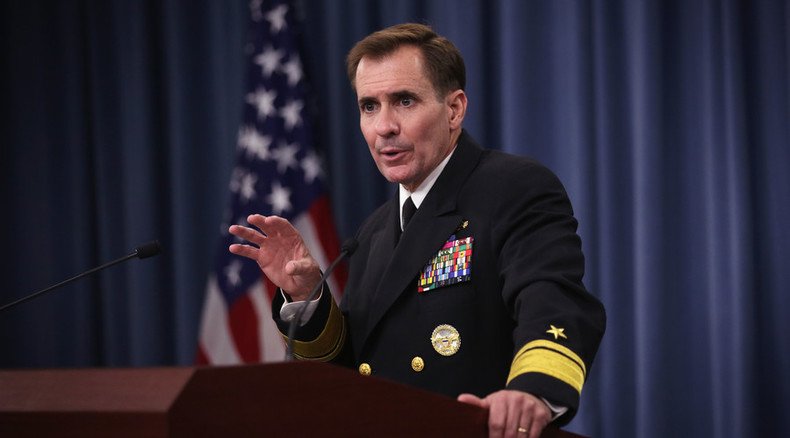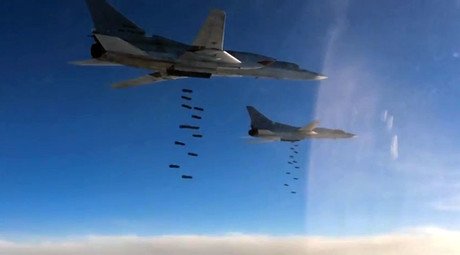Russia ‘must change strategy’ in Syria if it wants to join US-led ‘anti-ISIS’ coalition – State Dept

Russia is not welcome to join the US-led coalition in Syria, as France has proposed, until it changes its “focus” and stops “propping up” President Assad, the US State Department said. Yet, Washington continues to insist their goal isn’t defeating Assad.
“If other nations not in the coalition [the US-led coalition] want to join it and become part of it and focus on the fight against ISIL [Islamic State/IS, formerly ISIS/ISIL] that’s a conversation we’re certainly willing to have,” US State Department spokesperson John Kirby said.
An appeal to expand the US-led coalition fighting Islamic State came from French President Francois Hollande three days after deadly attacks in Paris a week ago. Stating that “France is at war,” Hollande called for the creation of a “large coalition,” which could unite forces with Russia “to achieve a result that has taken too long.”
READ MORE: 'For Paris!' Revenge messages on ISIS-bound Russian bombs
The grand coalition is going to be the focus of separate talks President Hollande will have with his American and Russian counterparts in coming days. The French leader is expected to hold talks in Washington on November 24 and in Moscow on November 26.
However, the US State Department says that Russia’s involvement in the coalition would depend on Moscow’s “commitment.”
“But in order for that to work, every member of the coalition has to have the same focus on defeating ISIL, and thus far we, talking about Russia, haven’t seen that same commitment,” Kirby said, referring to Russia’s support for the Syrian President Bashar Assad. “It’s inconsistent with the goals of the coalition, which is to defeat ISIL, if you’re also propping up the Assad regime.”
BREAKING: Russian cruise missiles target 7 #ISIS facilities in Syria - Defense Ministry https://t.co/BtpsERzL6Spic.twitter.com/5UVaDcydBw
— RT (@RT_com) November 20, 2015Washington has reiterated that there would be no discussions until Moscow changes its strategy: “If Russia is serious about this, about going after ISIL, and changing the calculus of military activities it’s conducting inside Syria, then it’s great and we will be willing to have a discussion with them about how they might be able to contribute to the coalition operations.”
The statement has prompted Said Arikat, Washington Bureau Chief for Al-Quds, to ask Kirby to clarify what the coalition’s priority actually was, because “the issue of Assad keeps coming up all the time.”
“So what’s the core goal? To beat Assad or ISIS? On a scale of one to ten – is one larger than the other?” Arikat asked Kirby.
READ MORE: ‘US militaristic faction continues to push for Middle East wars’ (OP-ED)
Despite, as is claimed by the State Department, the main goal of coalition being defeating Islamic State and curbing terrorism, President Assad remains a serious concern for Washington.
“There is nothing in the coalition’s mandate to remove Assad from power,” Kirby responded, adding that removing the current Syrian government would be “mutually supportive” in beating IS and “keeping them out.”
“But militarily, specifically militarily, the goal of the coalition to counter ISIL is about countering ISIL,” the State Department spokesman said.
‘We want to make no mistake’
Part of Friday’s press briefing was dedicated to the US-led mission’s efforts in and around Syria.
“We started the coalition last year, and didn’t focus on foreign fighters and other issues initially,” Special Presidential Envoy for the Global Coalition to Counter ISIL, Brett McGurk, said. The US is now going to focus on putting pressure on the “heartland of ISIL” and its links with Raqqa and Mosul.
US intentionally spare ISIS in Syria, want terrorists to weaken Assad – Russian FM https://t.co/K6aFA0DJMfpic.twitter.com/sqG4YvybOP
— RT (@RT_com) November 18, 2015“That was not possible about a year ago, even six months ago, but it is possible now,” McGurk said, adding that there is now an opportunity “to galvanize the entire coalition.” “We want to make no mistake,” McGurk said.
Outlining further steps the coalition will take in fighting IS, the presidential envoy specifically stressed two: “Suffocating” IS in Iraq and Syria and “suffocate the global networks.”
“That’s all I’ll say about that now, but the fact that last week we went after Jihadi John, Junaid Hussein getting slaughtered in an airstrike – that’s all going to continue. As we pressure ISIL, they make mistakes, do stupid things. So we’ll dial up the pressure in the coming weeks,” McGurk said.
READ MORE: ‘US rushed to strike ISIS oil network only after Russia intervened’ - official
Despite claiming significant progress, the US has been criticized, most vocally by Russian officials, for failing to stem the growth of IS despite a year of airstrikes, and even for “sparing” the terrorists’ units. Crucially, the US-led coalition refrained from bombing the oil trade ‘lifeline’ of Islamic State until this week.
“There were almost 8,000 military flights. Almost quarter of the time the jets came back without striking, taken to mean that they found no targets to attack. Meanwhile, ISIL continued to receive oil … thousands of tanker trucks drove all across the region,” the head of the Russian Foreign Ministry’s Department for New Challenges and Threats, Ilya Rogachev, told the Kommersant newspaper.
The official believes it was only Moscow’s intervention that made the US finally target the terrorists’ oil tanker vehicles.
“It’s impossible not to notice, that even this [US move to bomb IS tankers] was compelled by the decisive and effective actions of the Russian Air Force. Taking [the Russian strikes] into account, one can’t help but wonder: has the US-led coalition actually set a task of militarily defeating ISIL?”
By comparison, Russia destroyed some 500 IS tankers over the past few days, disrupting the flow of illegal petrodollars to the terrorist group, which, according to Russian President Vladimir Putin, is selling oil to some 40 states. The Russian Defense Ministry has released a video as proof of some of these strikes.
Russian warplanes disrupt ISIS oil sales channels; destroy 500 terrorist oil trucks in Syria.
In the latest development, warships from the Russian Caspian Fleet launched 18 cruise missiles at seven IS targets in the Syrian provinces of Raqqa, Idlib, and Aleppo on Friday. According to Russian Defense Minister Sergey Shoigu, over 600 terrorists were also killed in airstrikes involving cruise missiles in Syria’s Deir Ex-Zor Province.
LISTEN MORE:













